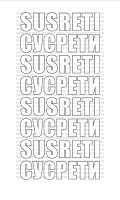
We kindly inform you that, as long as the subject affiliation of our 300.000+ articles is in progress, you might get unsufficient or no results on your third level or second level search. In this case, please broaden your search criteria.

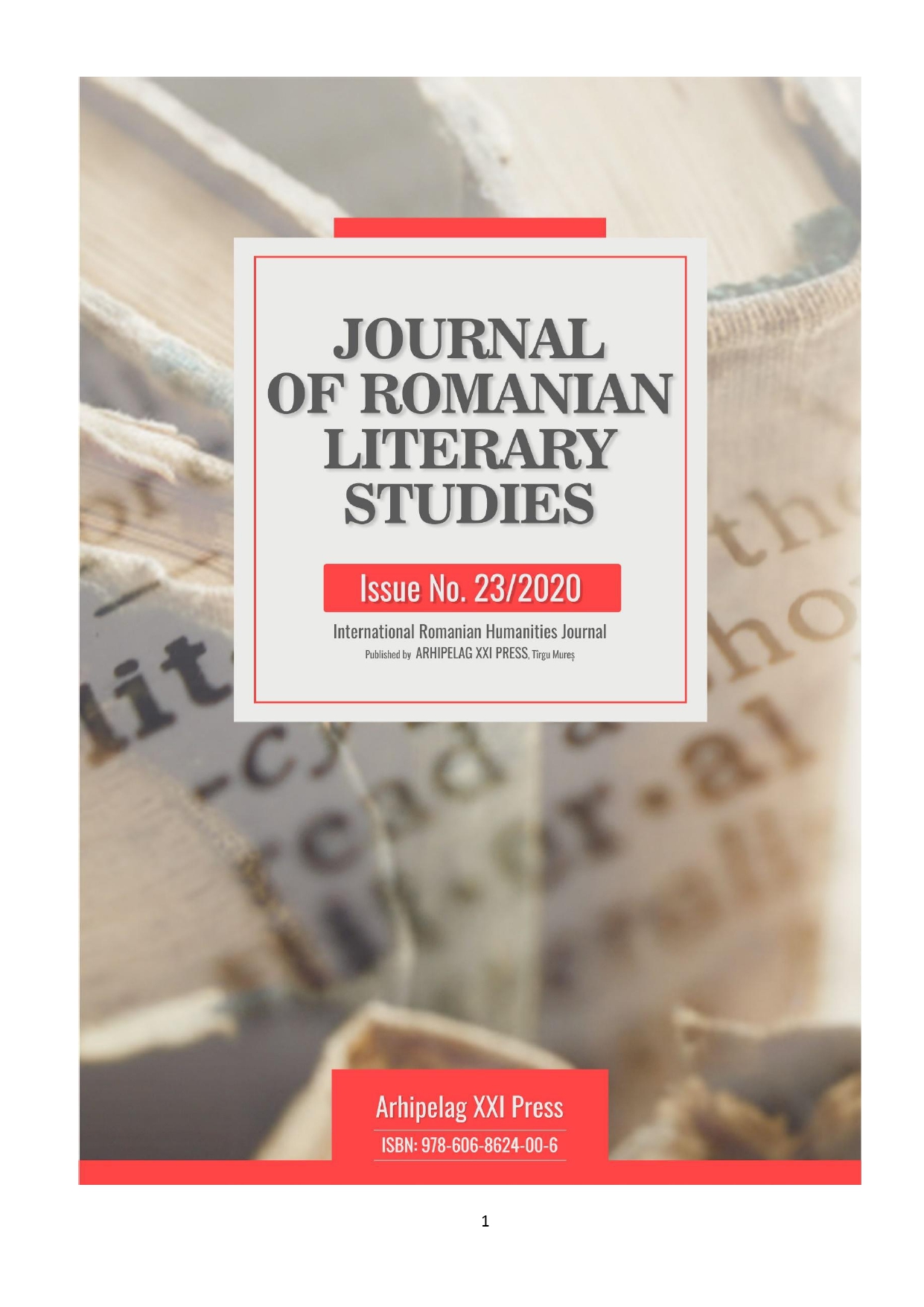
Washington Irving’s short fiction marks the transition from the tale to the short story in American literature. Although in many of his short stories he uses European sources, he also introduces elements which fit the normative definition of short fiction devised by Edgar Allan Poe. Also, Irving is one of the first writers to emphasize the importance of the elements of discourse and thus favour the artistic composition over the story. His use of irony and of the detached narrator are among his most important contributions to the development of the American short story.
More...
The erotic feeling and the idea of the couple, favourite themes of literature at all times, found in Gib Mihăescu’s short prose a completely unexpected context, being placed on the border between conscious and unconscious. We are discussing two short stories representative for the obsessive universe in which the heroes move: The Incident and The Dream. The main characters of these texts become the slaves of their own imagination or of some fixed ideas that break them from the rational world and for which they are willing to sacrifice months or even years. The action, most often triggered by jealousy, takes place more in the world of imagination than in the real world.
More...
Mihai Sin is one of the prose writers who can be included in the prose of daily life, his books always produced moderate reactions, but without making too much noise. His books always produced moderate reactions. His destiny as a writer is far from having received the true "frame", even if he writes at a time favourable to Romanian literature, when many young talents are discovered, being encouraged by social and political conditions since 1989. He does not want to write about a certain social category, he does not fix a certain one category of heroes, but wants to achieve a moral universe, which is true Mihai Sin writes without complex. He tries to never summarize destinies, but only states and situations, because of this Mihai Sin's short prose fits into a realism of details, through the detailed description of social issues, thus building frescoes of a drifting society. Mihai Sin is an authentic prose writer, a moralist with moderation and justice. His destiny as a writer is far from receiving the true "frame",even if he wrote at a turning point in Romanian literature. Cultivation of short prose a was a concern of the writer, who understood that short prose means the need for topicality, of direct and immediate approach to the realities we live. At the same time, this literary genre represents an intermediate stage towards the novel.
More...
Gib I. Mihăescu concentrated his creative force on a mental disorder which is born unconsciously, thus managing to transmit it literarily through an interesting and controversial artistic expression. His characters are the physical and psychological expression of various types of obsession. The tumult of the characters acquires relief in contrast to the elements of the quiet setting. Under the cover of the night, of terrifying solitude of a place full of "fantasy", the moon and the stars are masterfully captured, the cold and the blizzard stir up memories and exacerbate neurotic moods. He manages to create in most short stories an atmosphere of terror, anxiety and uncertainty, placing special emphasis on the outer frame, glacial and monochord, as a projection of the inner frame where the action takes place in reality. At the level of vocabulary, the oppressive atmosphere is translated by an abundance of superlative and hyperbolic expressions, by verbal constructions, epithets and comparisons. Everything appears exaggerated, sometimes slipping into triviality. In the Nature represented by Night, Cold, Ugliness, Desert, these elements that participate in soul crises seem to close archetypal valences. They do not only constitute an adequate framework, but they intervene in action as effects of delirium, of paroxysmal feelings. There is no short story that does not contain at least one term from the semantic field of anxiety. The most commonly used is the term "vision" and its synonyms: ghost, hallucination, phantom, strange appearance or adjectives such as strange, odd, terrible, sinister that refer to substantially identical moods.
More...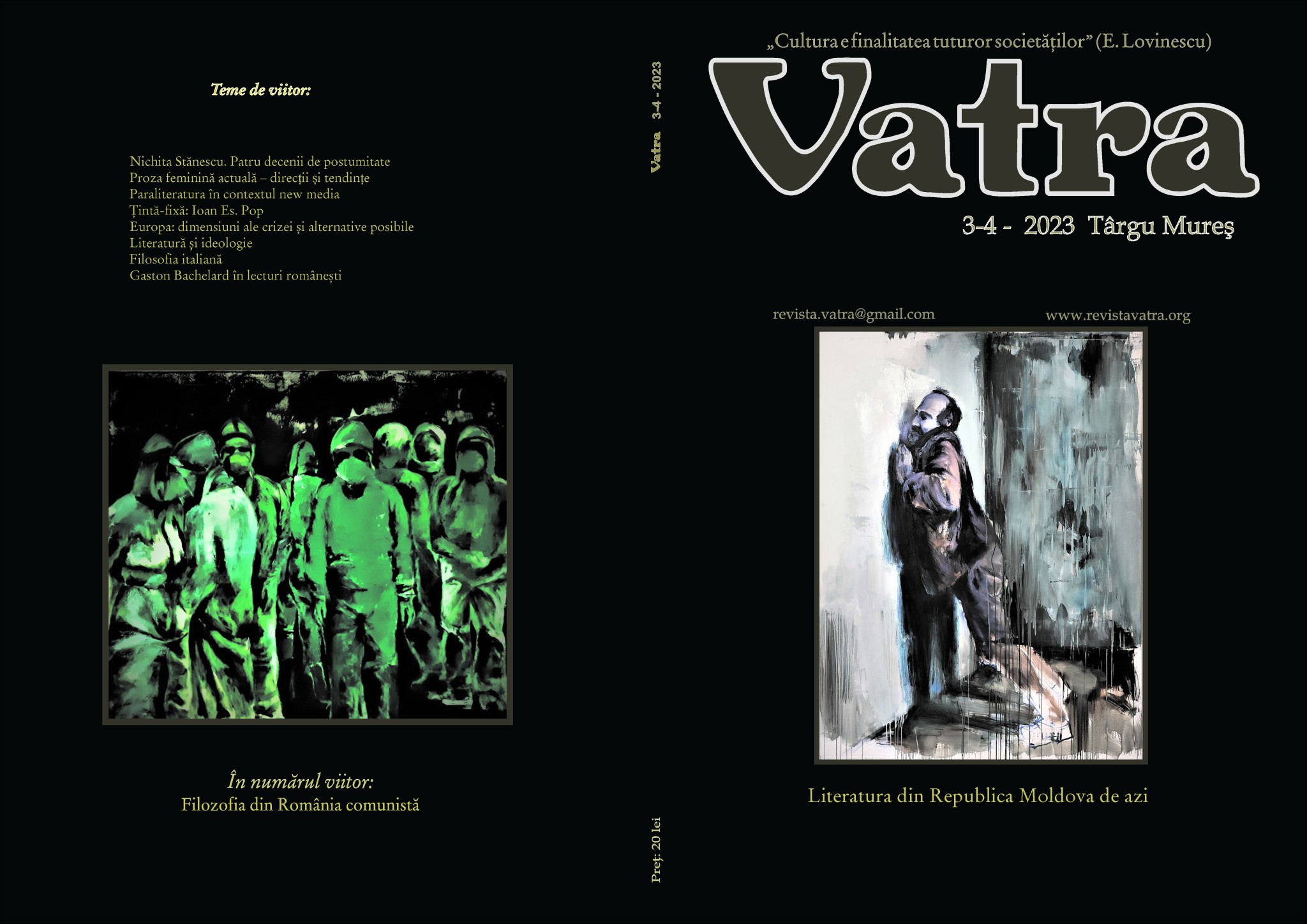
Fragments of prose: Lorina Bălteanu, Legată cu funia de pământ./ Leo Butnaru, Ultimul cititor în limba română./ Val Butnaru, Un roman de nepovestit. (Fragment din romanul în curs de apariție "Spinoza. Capricii")/ Liliana Corobca, RAI II. DIVINA TRAGEDIE (Fragment din romanul "Maestrul și Makarenko", în curs de apariție)/ Paula Erizanu, Capitolul 1. Inesa. Baugy-sur-Clarens, Elveția. Februarie-Martie 1917/ Iulian Fruntașu, Steaua lui Drotik/ Emilian Galaicu-Păun, Personne Nage. Nicolae Popa, Cubul de zahăr/ Ghenadie Postolache, Alt Continent/ Mihail Vakulovski, „De ce, Doamne? O radiografie a suferinței”/
More...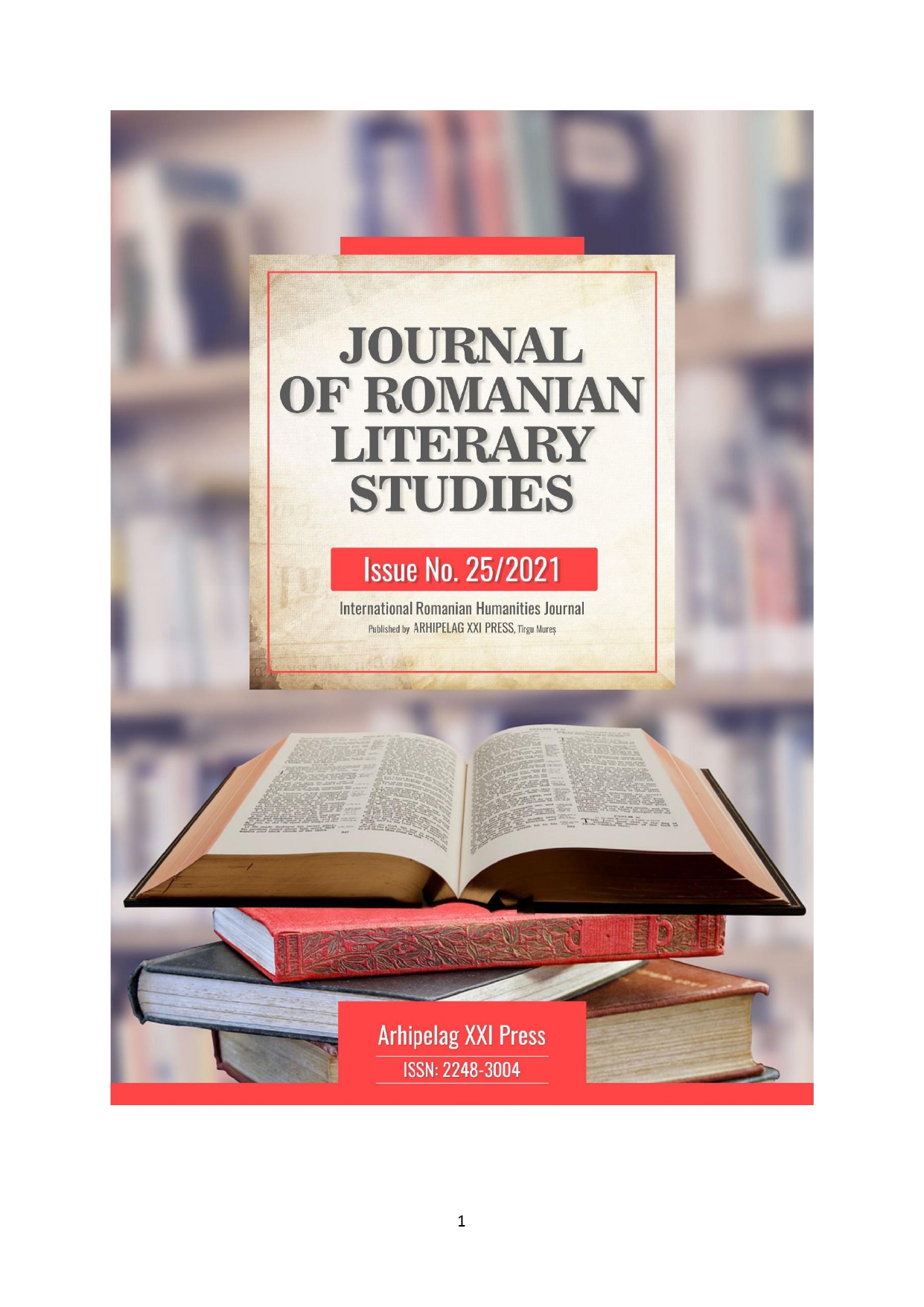
Unreliability is a narratological concept that is gaining more and more popularity in literary studies due to the insights it collocates from different approaches and its increasing use in contemporary literary fiction. The article draws on the multidisciplinary study of unreliability that combines the rhetorical and the cognitive approaches with a view to systematizing the categories and the criteria of unreliability in English literary fiction and identifying the array of discourse markers and clues that signal unreliable narrators. Generalizing from the results in the study of unreliability advanced by Ansgar Nünning, James Phelan, Vera Nünning and Monika Fludernik, the article seeks to analyze the manifestation of unreliability in the short story “Bridge of Music, River of Sand” by W. Goyen. The study focuses on two dimensions of the literary narrative, the narrative content, i.e., story, and the narrative form, also termed discourse, in order to determine the types and means of projecting the unreliable narrator in the selected text as well as the cognitive and epistemic functions of unreliability that impact on the reader’s reception of the content.
More...
Antun Gustav Matos (Matoš on Croatian) was a famous Croatian poet, short story writer, and journalist. He is considered to be responsible for opening Croatia to the world of European modernism. His first work from 1892, The Power of Conscience (Moć savjesti) marks the start of Croatian modern literature.
More...
The present article aims to bring into discussion the relevance of Ioan Groșan’s short prose, focusing, in particular, on his science fiction literature. Criticizing the ideal society proposed by the Communism, in two of the volumes the writer creates a robotic and a dystopian world which has a main goal: the creation of a new man. The author experiments different ways to deconstruct the clichés of literature, also, the society, the characters, their habits are always treated with visible irony. And last but not least, the humor is his most precious quality, constituting the charm of the prose.
More...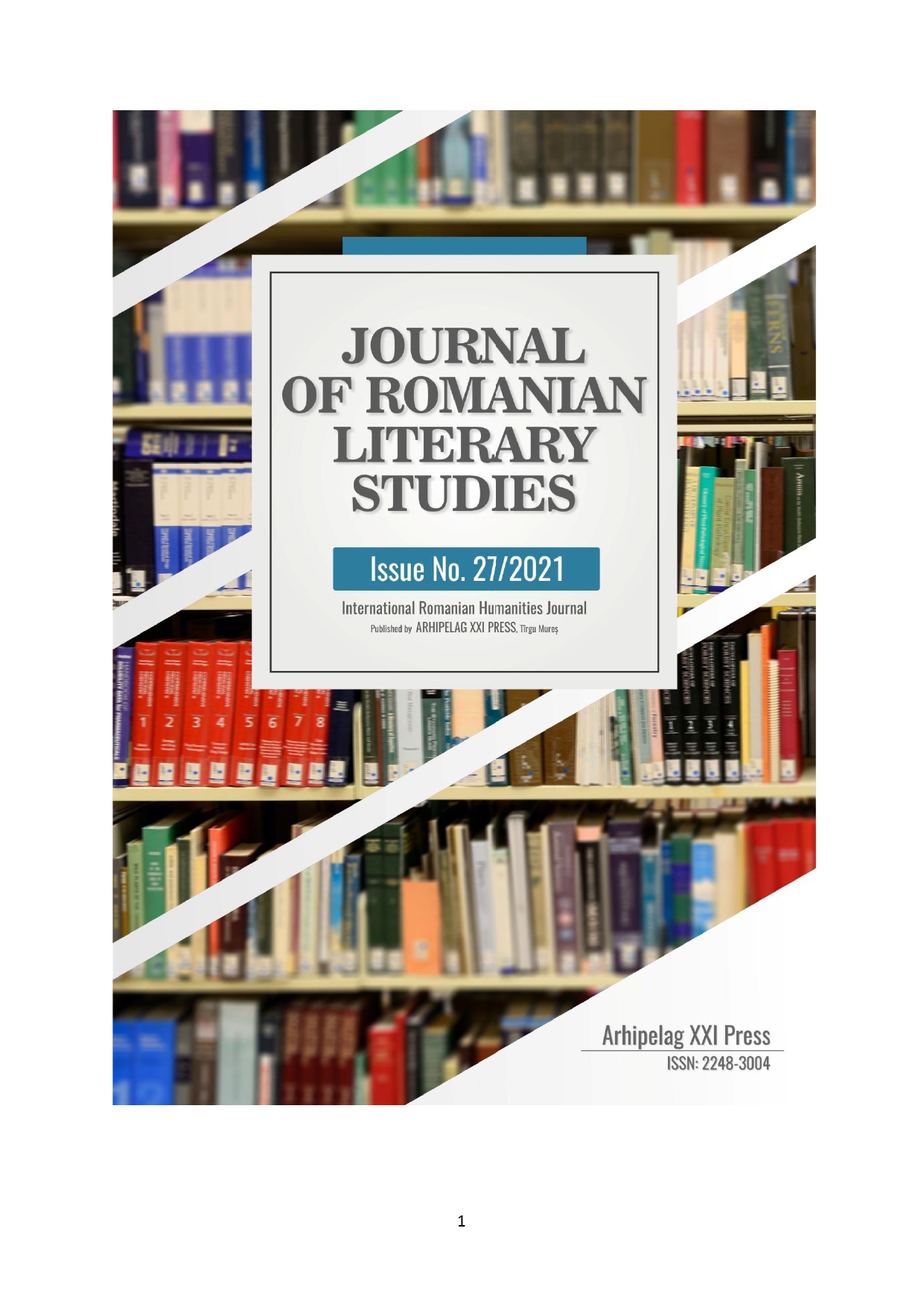
Marin Preda’s prose was channeled on two mediums, each corresponding to some essential stages in the author’s life: that of formation and then the step towards the “new” world, with strong communist, totalitarian accents. The rural world depicted in a crude and unstylized manner in the volume The Encounter in the Lands takes the form of the tragic and is consumed as steps of some fundamental experiences that prepare the Romanian’s later success. Dominant are the negative states, the need for violence, the mysterious fears, the hatred. What is surprising is the impersonal attitude and indifference of the narrator towards this almost inhuman universe born from the unpredictability of human behavior. Neither the tools of inner analysis nor the moralizing directions are missing. The heroes of Marin Preda’s prose are ordinary people, peasants for whom there is no other world than the everyday one and other inner movements than the natural ones. The skilful handling of the dialogue allows the narrator to come to the reader’s support, helping him to recompose a universe imbued with authentic life. The actions of the characters are part of a cold mechanism, devoid of lyricism, that of the daily life of the Romanian peasant. Marin Preda prefers to record the external effects of an underground space. Like his characters, he does not know what is going on in depth. His role is limited to the thorough recording apart from the effects of what happened inside.
More...
The beginning of the fantastic is considered, by most researchers, to be the myth, an inexhaustible source, which maintains an almost visible balance between the characters and their actions, in any fantastic story. The sudden evolution of the fantastic takes place between the XVIIIXX centuries, without imposing literary paradigms for a certain time interval, the process of developing the fantastic or the taste for the fantastic proving to be unstable, starting from Antiquity (mediated by the aesthetic formula of the menippean satire), until the era of contemporary modernism, being in the multiple form of the fantasy subgenres, especially the science-fiction one. The term fantastic originally signified the deceptive, fanciful, illusory universe, which does not belong to reality and cannot be explained or avoided, so the concept discussed evades any attempt to be defined, in a definitive and exhaustive way. The origin of the fantastic is associated with the menippean satire. The valorization of this species is found especially in the works of Antiquity: Satyricon, Petronius, and the stories of the writer Lucian, the Golden Donkey or Asinus Apuleius. Apuleius's novel is considered to be the first fantastic novel of Antiquity, because the imaginary is received ontologically dual, both from a human and animal perspective. By taking over the information from the Middle Ages and the Renaissance, the fantastic establishes its directions of evolution, oriented in the three periods congruent to the Romantic current: Pre-Romanticism, Romanticism and Post-Romanticism. The beginning of the forms of manifestation of the fantastic takes place in the Medieval period, when the fantastic short story is affirmed. The literary species that triggered the taste for fantasy in Romanticism is considered to be the horror novel, introduced by Ernst Theodor Amadeus Hoffmann in 1850. In the second part of late Romanticism, the writers Edgar Allan Poe and Gérard de Nerval mark the limit and paroxysm of the category of the fantastic. In Romantic literature, the fantastic is associated with the term of fantasy. Romantic aesthetics favors the mechanisms of the fantastic, thus representing a fashion, a universal pattern, an expressive matrix of the new sensitivity, which imposes its own rules in European thinking and culture. In Modernism, new meanings and approaches have been added to the concept, achieving associations of synonymous terms, such as fantasy.
More...
In this article we want to highlight some fantastic aspects in Macedonski's short prose to partially present the undeniable value in the evolution of the genre in Romanian literature. Fantastic prose yearns fluctuating between Apollonian and Dionysian, presenting a part of the spectacle of the writer who seeks and finds himself, who always perfects his means and gradually reaches his most important achievements. In the narrative texts, we can discover fragments of the Macedonian spirit that juggles between reality and dream, between truth and fiction. Odorescu reflects a primary stage of the Macedonian dream that gradually evolves in the prose Between the Huts, but especially in Nicu Dereanu.
More...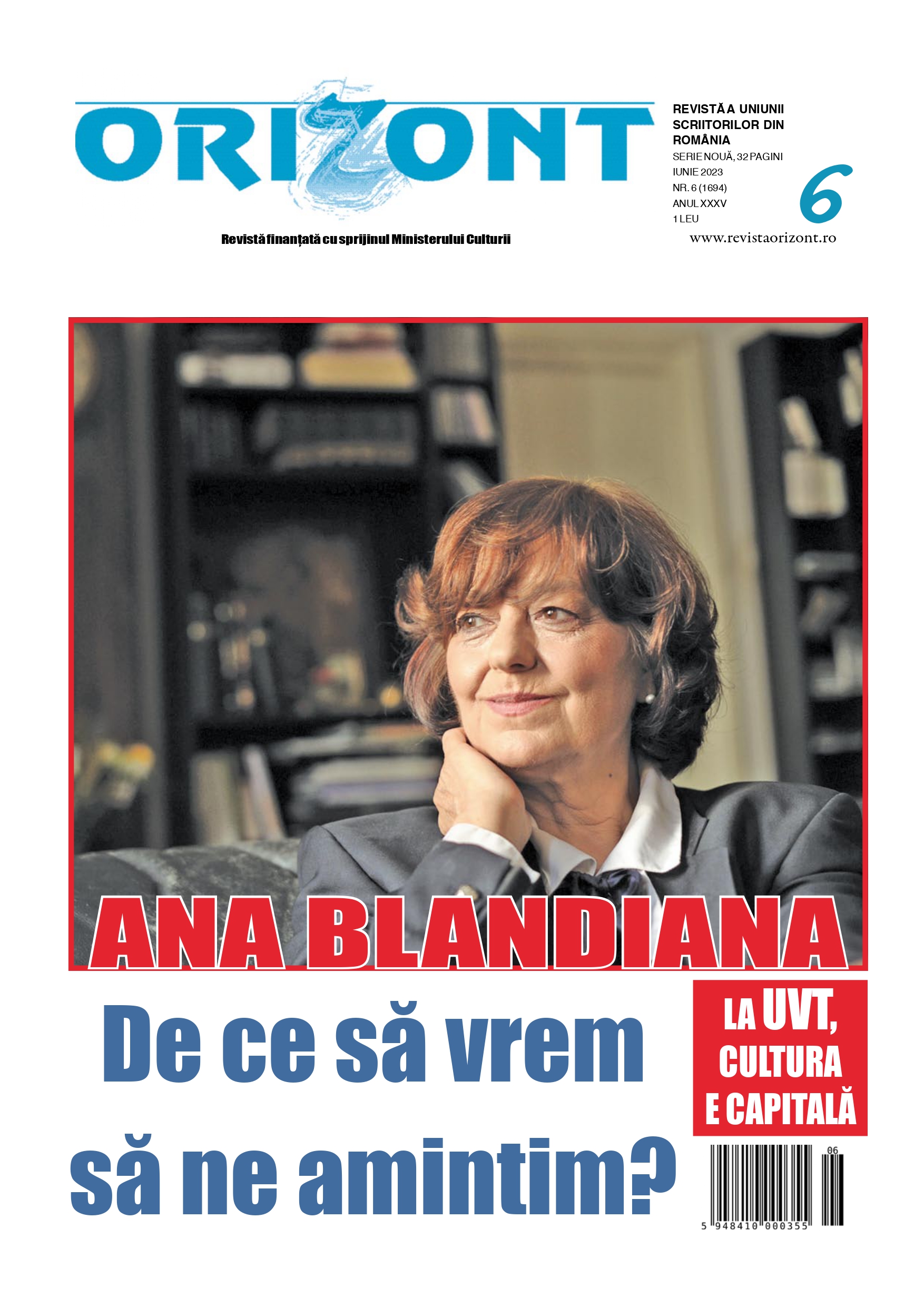
Essay by Marcel Tolcea - "The Fakir and the Graphologue". Short story by Călin-Andrei MihăIlescu - "Sun Abuse"
More...
Essay by Viorel Marineasa - "Bohemia and Utopia"/ Short story by Alexandru Potcoavă - "On Errors and Tombs".
More...
Review of: Sun Zi, Arta războiului, trad., pref., note Mugur Zlotea, ilustrații Mihail Coșulețu, Editura Humanitas, București, 2023, 158 p./ Short story by Adriana Cârcu - "At the Seaside (1)"
More...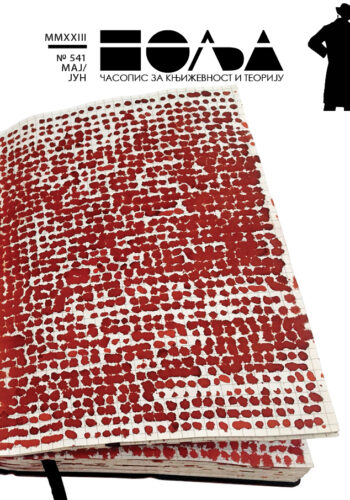

Essay by Dana Chetrinescu - "Youth without Old Age"/ Short story by Ciprian Vălcan - "Just Measure"
More...
This paper examines Florina Ilis’s most recent book, inspired by the recent state of events: the pandemic. The book brings together six short stories, all following the external crises of the world we live in, then gently gliding towards the internal ones, the short stories give expression to some internal crises, settled or not. The author's prose showcases a significant power of observation and interpretation therefore, the authenticity is strongly reflected in the dreams of the characters, who are put under a magnifying glass. Although puzzle-like, due to the author’s option for short stories, the book is unitary in vision, means and perspective.
More...
Romanian fantasy literature experienced an astonishing development in the twentieth century. The fantasy of mythology has retained its strength from ancient times to the present days, revaluing and reinterpreting ancient myths as an inexhaustible source of inspiration. The historian of religions, Mircea Eliade, pays special attention to the myth, stating that “myths thus reveal their creative activity and also the sacredness (or only the supernatural character of their works). After all, myths describe the various and sometimes dramatic outbursts of the sacred (or supernatural) in the world.” Thus the mythical, poetic knowledge, as a form of manifestation of unscientific thinking, represents a constant and a permanence of the human spirit, according to the author. Based on these considerations, Mircea Eliade creates several works with an authentic fantastic content, the short story “the Gipsies” being illustrative for the reason. Constantly swinging between the real and the unreal, Gavrilescu, the main character of the short story, lives in a confused state of dream and unreality. Entering the gypsies’ garden, he steps into a timeless world, full with symbols and heavy mythological shadows that penetrate the other realm. Due to the total fusion of the two realms, when he leaves here, the character can no longer make the difference between the two worlds and will go on an imaginary journey that represents a transition to death. Consequently, through the richness of the integrated symbols but also through the metaphorical subtlety of the presented action, Eliade's short story proves to be one of the most successful in the genre of Romanian fantasy literature.
More...
Short story by A’zam Rahnaward Zarjab: "Córka Sąsiadów"
More...